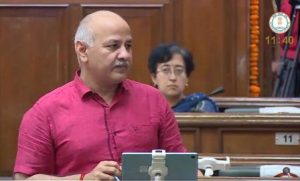Delhi ‘Deshbhakti’ Budget: Kejriwal government allocates 69,000 cr
The AAP government will install 500 tricolor flags across the city, and introduce specialized mohalla clinics for women.
The Delhi legislative assembly was filled with the air of Bhagat Singh, Basheer Badr, and the Dead Poets Society as Deputy CM and Finance Minister Manish Sisodia introduced the capital’s 7th budget. Titled as ‘Deshbhakti’ budget, it has allocated 69,000 crores, the highest ever, to the development of Delhi in the financial year 2021-22.
‘Deshbhakti’ budget, it has allocated 69,000 crores, the highest ever, to the development of Delhi in the financial year 2021-22.
While references of the freedom fighter Bhagat Singh influenced sectors of nationalistic development, couplets of famous poet Basheer Badr influenced the allocation for the health sector.
In the one hour speech, Mr. Sisodia mentioned a number of times that the current budget, being introduced in India’s 75th year of Independence, has been chalked out with the development ideals for the next 25 years, where India will celebrate its 100th year of Independence. “In the 100th year, 2047, we want Delhi to be the center-point of discussion,” he said.
Also Read : Delhi’s growing water crisis: ‘Day Zero’ is not far
Stressing on how this is the highest ever budget allocated for the development of the national capital, Mr. Sisodia mentioned that the per capita (per person) expenditure this year would be Rs 33,000. 55 percent of the total budget would be reserved for welfare projects, while 45 percent would be reserved for government expenditure.
The Arvind Kejriwal government will be also be installing 500 tricolor flags on the occasion of the 75th Independence Day, and will organize programs about Bhagat Singh and BR Ambedkar as well. Delhi will also be grounds to its first Sainik School and Delhi Armed Forces Preparation Academy.
A total of Rs 16,377 crore was allocated towards the education sector, which will see its own education board soon. A new curriculum for school children (Nursery to 8th) would be introduced, which will have compulsory ‘deshbhakti’ classes every day.
The healthcare sector was allotted Rs 9934 crores, which is about 14 percent of the total budget. Mr. Sisodia introduced the health budget with a Basheer Badr couplet: Koi haath bhi naa milayega jo gale miloge tapak se, ye naye mizaaj ka shehar hai zara faasle se mila karo (No one will shake hands or hug, since this city has a new behavior. Maintain distance when you meet). Comparing this to COVID-19 guidelines, Mr. Sisodia stressed on the need to have higher budgetary allocations towards health after a year of going through the pandemic.
The government will, hence, be providing free COVID-19 vaccine in all state government hospitals. Mohalla clinics specialized for women will also start operations next year, with 100 clinics being installed in all the wards. All citizens in Delhi will also be given a health card to have a centralized database of their medical history.
Mr. Sisodia, while narrating a quote from the famous Hollywood film Dead Poets’ Society, stressed on the importance of art and culture. He also allocated part of the budget to developing the tourism sector and making tourist places safe for women by installing CCTV cameras and LED lights at all monuments.
Here are other important takeaways from the budget:
– Youth for education mentorship volunteer programme to be started where underprivileged children will receive training and education
– Programme for those aged 75 years and above to be organized on the occasion of 75th Independence day.
– As part of the entrepreneurship curriculum, students in 11th and 12th will be given Rs 2000 each to help kick-off their business/start-up ideas.
– First virtual model school to be started where distance education will be possible for students from other states.
– Delhi Law University and a specialized teacher’s university to be introduced.
– Bid to ensure 25 per cent of all registered cars to be electric by 2024. 500 charging stations will also be installed.
– Free DTC and DMRC transportation for women will continue next year as well
– Anganwadi hubs to be also used as ‘Saheli Samman Kendra,’ which will work as local incubators for women.
